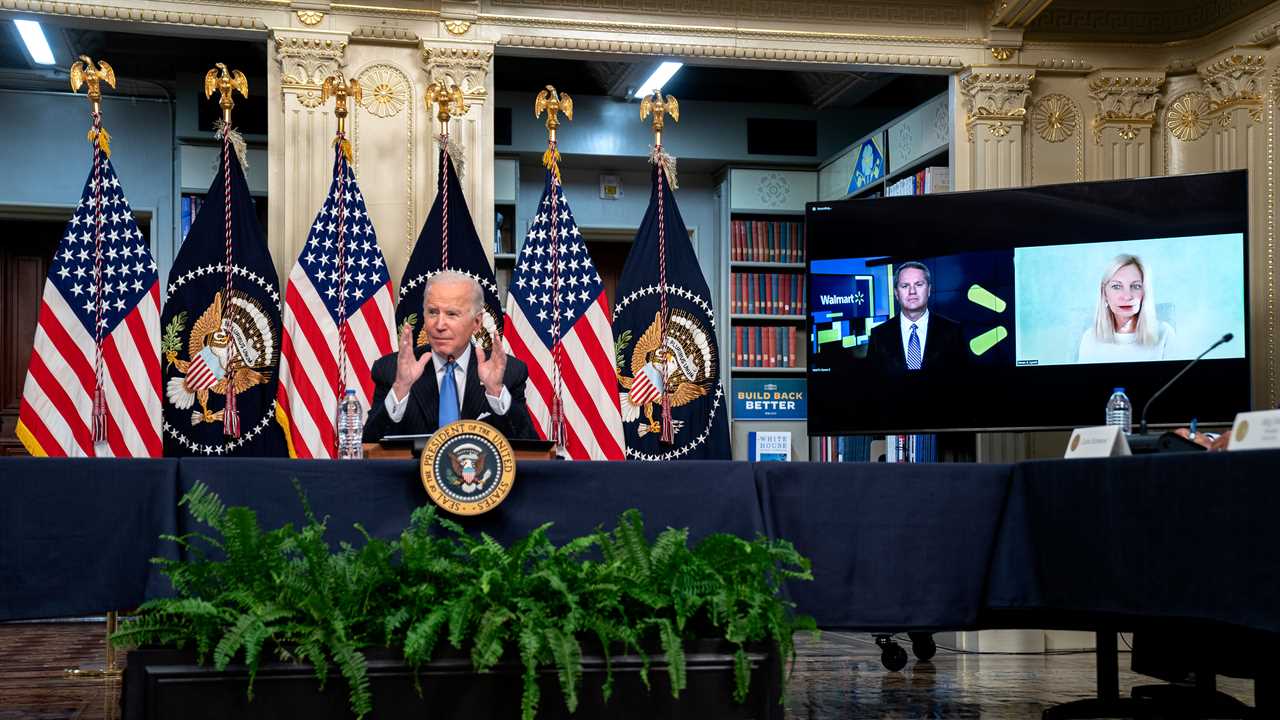
President Biden told executives from some of the nation’s largest retailers on Monday that his administration was committed to partnering with them to untangle supply chains and ensure that American consumers can find everything they want this holiday season, as a surge in shopping tests an already strained global delivery system.
Mr. Biden had planned to speak following his supply-chain meeting with top executives from large grocers, like Food Lion and Kroger, and a range of retailers, like Best Buy and Etsy. But administration officials abruptly canceled his White House remarks less than a half-hour before Mr. Biden had been scheduled to speak, saying the president wanted to spend more time in conversation with the executives. His remarks were rescheduled for Wednesday.
The meeting was part of a larger effort by the president to show he is doing everything he can to combat inflation and ensure a more normal holiday shopping season as Covid-19 continues to persist. Mr. Biden has made a push to unclog ports, address trucker shortages and take other steps to alleviate the pressure created by consumers looking to buy couches, cars and electronics instead of eating out or going to theme parks.
But the White House has limited reach to affect a supply chain that is controlled by private companies and shaped by larger forces, like the pandemic and consumer demand.
Still, top officials tried to reassure a nervous public on Monday that consumers would be able to purchase what they want.
“There are going to be toys on your shelves,” Jen Psaki, the White House press secretary, told reporters after noting that Black Friday sales were up by nearly a third this year in preliminary estimates. “There is going to be food in your grocery stores.”
Shipping costs have begun to recede slightly from stratospheric highs as West Coast ports work to reduce congestion. Officials announced new measures on Monday to incentivize night and weekend container pickup at ports, and they highlighted data showing a continued decline in the backlogs of unloaded containers.
But many trade experts say the supply chain crisis is far from over. Extraordinarily high demand in the United States for products made in Asian factories, combined with a shortage of truckers and warehouse workers, means supply chain issues are likely to be long-lived.
Phil Levy, the chief economist at Flexport, a freight forwarder, said that the organization’s data “does not show things getting much better. Not yet.”
He said the dramatic increase in demand in the United States for goods had created a backlog of orders that will take months to fulfill. Congestion could even persist through next year, he said, unless an early end to the pandemic or a market crash suddenly encourages Americans to curtail their spending.
While companies of all sizes continue to face shipping delays and elevated transportation costs, most major retailers have said they expect their shelves to be fully stocked during the holidays. Companies have gone to extraordinary measures to procure goods in time for the holidays, including chartering their own vessels and shipping products by air instead of by sea.
In a letter sent to Mr. Biden on Monday, the Retail Industry Leaders Association, which represents major retailers like Best Buy, CVS, Food Lion and Walmart, urged the administration to “facilitate a few additional short-term steps” to keep goods moving through ports, like improving restrictive appointment systems for truckers and requiring ports and ocean carriers to accept the return of empty containers, as well as making longer term investments in port infrastructure.
Judah Levine, the head of research at Freightos, an online freight marketplace, said that the ports of Los Angeles and Long Beach had started to show signs of easing congestion and had been using “sweeper” ships to help reposition empty containers around the port.
Cargo prices from Asia to the United States have also receded in the past few weeks, according to Freightos, but those prices are still nearly quadruple what they were at the same time last year.






